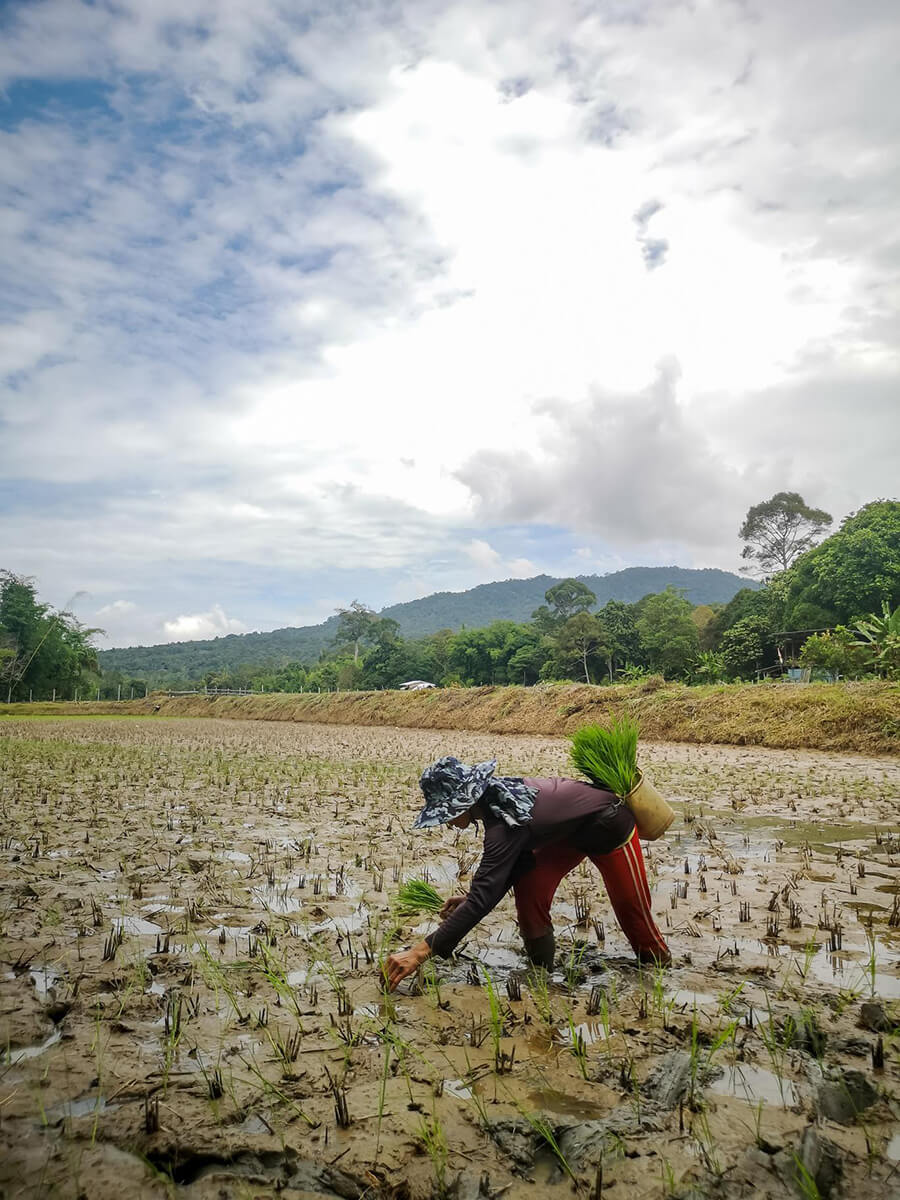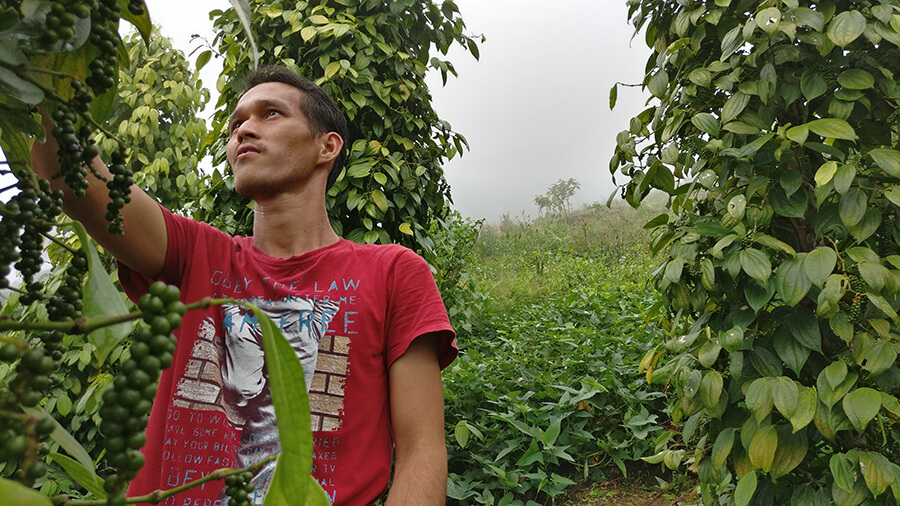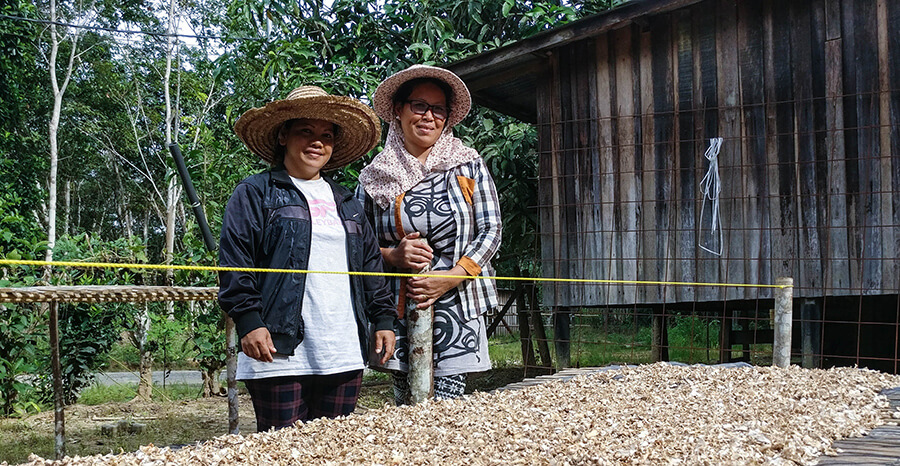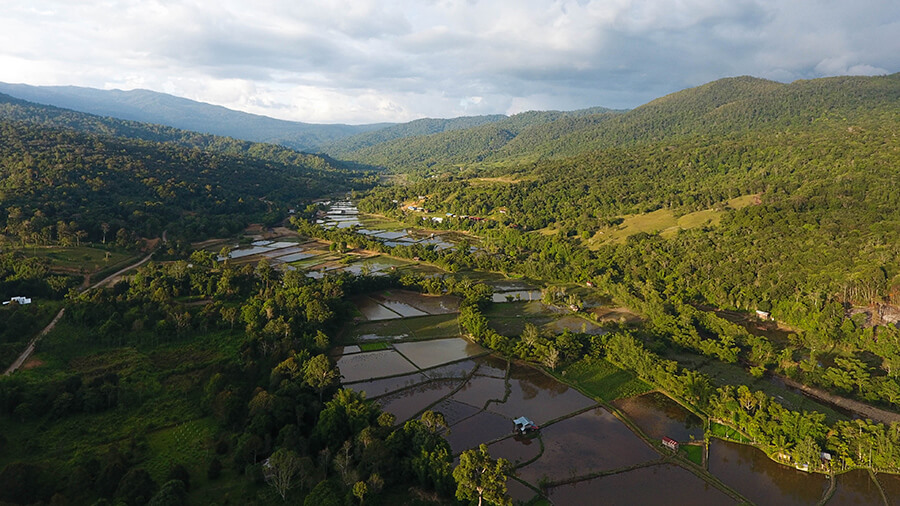How A Social Enterprise Revitalized Rural Economies in Borneo
Meet the young Malaysian entrepreneurs behind Langit Collective, who are bridging the gap between Borneo’s rural farmers and urban consumers on the hunt for premium produce.
Tucked away in the remote villages of Borneo, generations of farmers have been producing some of Malaysia’s best heirloom rice. And until recently, their carefully-tended rice crop was never sold commercially– until a group of volunteers spotted a gap in the market.
Enter Langit Collective: a social enterprise that stepped in to help revitalize rural communities and create revenue for some of Malaysia’s underserved farmers. We spoke to Lilian Chen, CEO of Langit Collective, to find out more about her remarkable entrepreneurship journey.
Enter Langit Collective: a social enterprise that stepped in to help revitalize rural communities and create revenue for some of Malaysia’s underserved farmers. We spoke to Lilian Chen, CEO of Langit Collective, to find out more about her remarkable entrepreneurship journey.

Q: How did the business begin?
All of Langit’s co-founders started out as colleagues, working for a non-profit building basic infrastructure for rural communities in Borneo, Malaysia. In 2015, we were working in a Lun Bawang village in the highlands of Lawas.
It’s a deeply special place: a valley enveloped by rainforest and hidden from the outside world. It was here that we first came across one of the best crops the land here can offer: heirloom rice.
Thanks to pristine air quality and beautiful streams surrounding the paddy field, the rice produced here is completely unique. As we sat down to meals of heirloom rice each day during our stay with local families, we realized that an opportunity was being missed.
Despite traditional rice farming practices being carefully passed down through generations, the rice was only used locally and any surplus was often fed to livestock.
All of Langit’s co-founders started out as colleagues, working for a non-profit building basic infrastructure for rural communities in Borneo, Malaysia. In 2015, we were working in a Lun Bawang village in the highlands of Lawas.
It’s a deeply special place: a valley enveloped by rainforest and hidden from the outside world. It was here that we first came across one of the best crops the land here can offer: heirloom rice.
Thanks to pristine air quality and beautiful streams surrounding the paddy field, the rice produced here is completely unique. As we sat down to meals of heirloom rice each day during our stay with local families, we realized that an opportunity was being missed.
Despite traditional rice farming practices being carefully passed down through generations, the rice was only used locally and any surplus was often fed to livestock.

We’d all grown up in the city and would have been over the moon to get access to this amazing, delicious produce where we lived! It got us thinking. Heirloom rice was a premium product with great potential – but no market.
Our collective was born, and our mission to create market access for indigenous farming communities in Sabah and Sarawak began. Our goal was simple: to link quality excess produce from rural farmers to urban markets. This would provide rural communities with a new income opportunity above and beyond their subsistence agriculture.
Q: As an enterprise working with suppliers in remote or cut-off areas, what challenges have you faced so far?
The first one is logistics. The physical remoteness of the villages is a major challenge. There is no infrastructure in this part of Borneo, meaning logistic solutions are hard to come by and extremely costly.
Incredibly, it can take two months or more to move rice from the villages to our warehouse in West Malaysia. We had to spend a huge amount of time testing and route-mapping exactly how to do this, and put an entire transportation system in place where none existed before.
The highland farms are four hours away from the nearest town by dirt track, so we had to make sure they can be reached using 4x4s and drivers experienced with the area and terrain.
The second is cash flow. As our farmers get paid in cash at the farm gates, our capital is mostly tied up in stock that spends a lot of time in transit. This poses a major growth challenge to us. We need regular access to funds to expand our business.
Our collective was born, and our mission to create market access for indigenous farming communities in Sabah and Sarawak began. Our goal was simple: to link quality excess produce from rural farmers to urban markets. This would provide rural communities with a new income opportunity above and beyond their subsistence agriculture.
Q: As an enterprise working with suppliers in remote or cut-off areas, what challenges have you faced so far?
The first one is logistics. The physical remoteness of the villages is a major challenge. There is no infrastructure in this part of Borneo, meaning logistic solutions are hard to come by and extremely costly.
Incredibly, it can take two months or more to move rice from the villages to our warehouse in West Malaysia. We had to spend a huge amount of time testing and route-mapping exactly how to do this, and put an entire transportation system in place where none existed before.
The highland farms are four hours away from the nearest town by dirt track, so we had to make sure they can be reached using 4x4s and drivers experienced with the area and terrain.
The second is cash flow. As our farmers get paid in cash at the farm gates, our capital is mostly tied up in stock that spends a lot of time in transit. This poses a major growth challenge to us. We need regular access to funds to expand our business.

And most consumers have no idea of the complex bureaucratic challenges that exist when it comes to selling rice! Conventional white rice is the standard measure used by the Malaysian government to gauge food security, which means the entire industry is heavily regulated.
Every player in the supply chain of the paddy or rice industry – no matter how minor – requires a license that can be expensive and onerous to procure. This prolongs the time it takes to move rice from Sarawak to Kuala Lumpur and further exacerbates our capital problems.
One other challenge is the inconsistency of the end-product when using rice from indigenous farmers. As subsistence farmers, the Lun Bawang communities are not over-particular about the rice that they mill.
Broken rice or over-polished rice is perfectly acceptable to eat, but not acceptable to be sold to the market. Every single round of procurement means another quality control conversation with the farmers, but they too are limited by their homestead milling machines, which don’t offer many options to fine-tune.
Q: How do you measure success?
The financial impact that we create is pretty straightforward, as any rice procured from the community is already additional income that would have not otherwise been monetized.
Beyond a number, the additional income means that some farmers can finally afford to buy tiles for the kitchen or toilets for their house, which has been a continuous work in progress for the past 20 years.
It can also mean that they can afford to fly their children who are in boarding schools across the country back home, even for a short holiday. As a social enterprise, what we measure is community impact and the overall economic wellness of rural areas.
Every player in the supply chain of the paddy or rice industry – no matter how minor – requires a license that can be expensive and onerous to procure. This prolongs the time it takes to move rice from Sarawak to Kuala Lumpur and further exacerbates our capital problems.
One other challenge is the inconsistency of the end-product when using rice from indigenous farmers. As subsistence farmers, the Lun Bawang communities are not over-particular about the rice that they mill.
Broken rice or over-polished rice is perfectly acceptable to eat, but not acceptable to be sold to the market. Every single round of procurement means another quality control conversation with the farmers, but they too are limited by their homestead milling machines, which don’t offer many options to fine-tune.
Q: How do you measure success?
The financial impact that we create is pretty straightforward, as any rice procured from the community is already additional income that would have not otherwise been monetized.
Beyond a number, the additional income means that some farmers can finally afford to buy tiles for the kitchen or toilets for their house, which has been a continuous work in progress for the past 20 years.
It can also mean that they can afford to fly their children who are in boarding schools across the country back home, even for a short holiday. As a social enterprise, what we measure is community impact and the overall economic wellness of rural areas.

Q: Do you have plans to expand your business cross-border? Are there any other markets you’re targeting?
We started our journey with the indigenous communities of rural Malaysia - and this has led us into a larger conversation on food systems and sustainability.
Eight years on, we now work with other farming communities producing different crops, and collaborate with like-minded organizations across the country.
Our products are available in retail outlets across Malaysia and on our website – and we’re looking to expand to other markets in Southeast Asia. Our first target is Singapore, where we have interest from chefs who would like to import our ingredients.
We’re also part of the push to help elevate the culinary industry and heritage of Malaysia, to try to explore what modern Malaysian cuisine can be and its global and commercial potential. As part of a network of artisanal producers championing heritage ingredients, we look forward to more meaningful collaborations with brands and organizations that work towards sustainability and quality.
Q: What takeaways and insights do you have for social enterprises in Asia and beyond?
There’s still a lack of understanding about what a social enterprise model can look like, even among potential investors. There’s a distinct lack of resources afforded to social enterprises, too, in comparison to tech startups in Asia, for example.
There is, however, a role for social enterprises to play, plugging some of the gaps that governments or NGOs might have missed.
We started our journey with the indigenous communities of rural Malaysia - and this has led us into a larger conversation on food systems and sustainability.
Eight years on, we now work with other farming communities producing different crops, and collaborate with like-minded organizations across the country.
Our products are available in retail outlets across Malaysia and on our website – and we’re looking to expand to other markets in Southeast Asia. Our first target is Singapore, where we have interest from chefs who would like to import our ingredients.
We’re also part of the push to help elevate the culinary industry and heritage of Malaysia, to try to explore what modern Malaysian cuisine can be and its global and commercial potential. As part of a network of artisanal producers championing heritage ingredients, we look forward to more meaningful collaborations with brands and organizations that work towards sustainability and quality.
Q: What takeaways and insights do you have for social enterprises in Asia and beyond?
There’s still a lack of understanding about what a social enterprise model can look like, even among potential investors. There’s a distinct lack of resources afforded to social enterprises, too, in comparison to tech startups in Asia, for example.
There is, however, a role for social enterprises to play, plugging some of the gaps that governments or NGOs might have missed.

With the recent emphasis placed on ESG, there’s now a lot more attention and interest in social enterprises, especially for big corporations looking to incorporate impact into their reporting and operations.
Most social enterprise models are built with at least one of the components of ESG in mind, so it’s only natural that social enterprise operations fulfil or even exceed some ESG requirements.
Q: What advice do you have for budding entrepreneurs?
Anything that’s worth doing is probably going to be challenging. And things take time. It took us one and a half years to convince the chef of a well-known restaurant to work with us and feature some of our products on his menu.
Also, think about how your business intersects with other areas, and what you can offer alongside your main revenue stream. One thing we offer is experiential travel: immersive experiences for customers, partners, and other stakeholders to come and experience a harvest or paddy tour. These deepen understanding of our business, encourage investment and strengthen existing partnerships.
Demonstrating what your business offers first-hand, and on a human level, is important – whether that’s a retail space, factory or workshop tour. In-person connections help get to the heart of your product and what you do.
Helping to create a new narrative for rural farming
The entrepreneurial journey of Lilian Chen and her fellow co-founders sets an aspirational example for future entrepreneurs, especially social enterprises or female-owned startups looking to help drive social and economic impact locally.
To find out more about Langit Collective, visit their website here.
To find out how FedEx can help get your business off the ground, or solve a unique logistics need, head here.
Most social enterprise models are built with at least one of the components of ESG in mind, so it’s only natural that social enterprise operations fulfil or even exceed some ESG requirements.
Q: What advice do you have for budding entrepreneurs?
Anything that’s worth doing is probably going to be challenging. And things take time. It took us one and a half years to convince the chef of a well-known restaurant to work with us and feature some of our products on his menu.
Also, think about how your business intersects with other areas, and what you can offer alongside your main revenue stream. One thing we offer is experiential travel: immersive experiences for customers, partners, and other stakeholders to come and experience a harvest or paddy tour. These deepen understanding of our business, encourage investment and strengthen existing partnerships.
Demonstrating what your business offers first-hand, and on a human level, is important – whether that’s a retail space, factory or workshop tour. In-person connections help get to the heart of your product and what you do.
Helping to create a new narrative for rural farming
The entrepreneurial journey of Lilian Chen and her fellow co-founders sets an aspirational example for future entrepreneurs, especially social enterprises or female-owned startups looking to help drive social and economic impact locally.
To find out more about Langit Collective, visit their website here.
To find out how FedEx can help get your business off the ground, or solve a unique logistics need, head here.
***
-
Previous
 Why E-Commerce Should Embrace The Circular Economy
Why E-Commerce Should Embrace The Circular Economy -
NextHow To Use Automation To Enhance Your E-Commerce Business

















 The Latest
The Latest